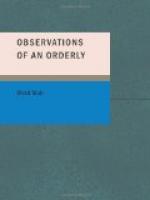As I started to wheel a much-bandaged warrior to his ward, the recreation-room door opened and a burst of music-cum-essence-of-nigger emerged on his astonished ears. I was a little doubtful as to whether our new guest would not think his reception somewhat flippant in key. The poor fellow was visibly suffering, and the sound of tambourines and comedians’ guffaws seemed a scarcely proper comment on his condition. I might have spared myself these misgivings. “Say, chum,” he interrogated me feebly, “what’s that noise?” “Nigger minstrels, old man.” “Golly!—and have I got to go straight to my bed?”
Alas, he had to. It would be long before he could be well enough to be taken to one of our entertainments. But, had he been given his way, he would have gone direct from his fatiguing overseas journey into the Old Rec. to join the family party and chuckle at Mr. Bones and Massa Jawns’n.... No doubts assailed his mind as to whether it was right to “waste bed-space” on mere frivolities. A nigger minstrel show was to him a deal more important, in fact, than his wound. And perhaps, in instinct, he was not far wrong.
XII
THE COCKNEY
Before I enlisted I was lodging in a house which it was occasionally convenient to approach by a short cut through an area of slumland. One night when traversing this slum—the hour was 1.30 a.m.—I was stopped by a couple of women who told me that there was a man lying on the ground in an adjacent alley; they thought he must be ill; would I come and look at him?
They led me down a turning which opened into a narrow court. This court was reached by an arched tunnel through tenement houses. The tunnel was pitchy black, but I struck matches as I proceeded, and presently we came upon the object of my companions’ solicitude—a young soldier, propped against the wall and with his legs projecting across the flagstones. The women had, in fact, discovered him by tripping over those legs in the darkness.
They were slatternly women, but warm-hearted; and when I had managed to arouse the gentleman in khaki and hoist him to his feet (for the cause of his indisposition was plain—and he had slept it off) they called down blessings on my head and overwhelmed our friend with sympathy which he did not wholly deserve and to which he made no rejoinder. Nor did he vouchsafe any very lucid answer when I asked him whither he was bound. I was prepared to pilot him—but I could hardly do so without knowing towards which point of the compass he proposed to steer, or rather, to be steered. “I know w’ere I wanter go,” was all I could get out of him. Very well; if he knew his address, it was no concern of mine; he could lead on; I would act as a mere supporter. In this capacity, with my arm linked firmly in his, I brought him forth from the tunnel to the street (he had no wish, it seemed, to go through the tunnel into the court), and here we bade farewell to the ladies.




